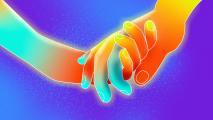Field: Love
Oxytocin’s effects aren’t just about love
At last, neuroscientists are learning how the hormone shapes social behaviors such as pair-bonding and parental care. It’s more complicated than they thought.
Partnering up can help you grow as an individual – here’s why
The science makes it abundantly clear that couples with more self-expansion are better relationships. Here's why.
“5 stages of grief” is a myth — and knowing that helps us better cope with loss
The “monomyth” model of grieving offers closure and recovery, but in most traditional cultures the dead never leave the living.
More Americans than ever have no friends. Here are 5 steps to make more friends.
The last decade has seen a steep drop in adult friendships and a worrying increase in loneliness. Is this the cost of our modern life?
“Relationships 5.0”: Are people going to start dating AI?
Online dating is so mainstream that you’re an outlier if you haven’t met your partner on an app — so why not AI?
Mathematicians suggest the “37% rule” for life’s biggest decisions
Mathematicians tell us that, to maximize the chances of the best outcome, we ought to ditch the first 37% of any options.
How a healthy sex life can help minimize depression and anxiety symptoms
When you struggle with anxiety or depression, sex may be the last thing on your mind. But it can be a tool for well-being.
How gratitude makes you more attractive
In partnership with John Templeton Foundation
New research shows that having an attitude of gratitude is key to healthy relationships, and it can virally impact society.
Can an app help you have better sex?
An app created by a sex therapist is helping couples learn how to have better sex by exploring their own desires and discovering their partner’s.
The case for love-enhancing drugs
Drugs don’t just affect the user; they shape relationships too. And a pair of bioethicists thinks we should consider them for relationship enhancement.
Hacking the Tinder algorithm to find love
Dating apps are really good at introducing you to lots of people, but they might not be the best way to find a lifelong partner. Can we decode our data to get better results?











